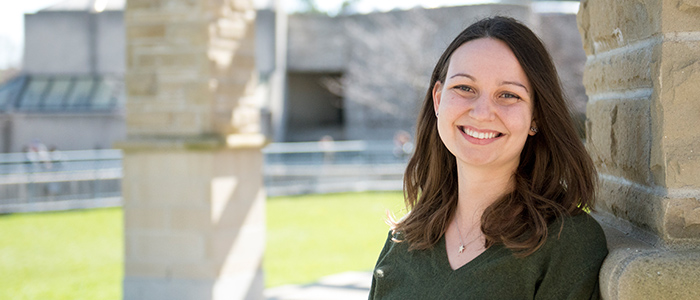Giving purpose to personal identity
By Emily Leighton, MA’13
Madeline Arkle, BSc’14, Medicine Class of 2018, is an experienced time traveller. For four summers, she journeyed back to the 1850s in search of her Métis heritage.These adventures took place at Lower Fort Garry National Historic Site in Manitoba. Donning historic costumes and identities, Arkle presented re-enactments and storytelling focused on treaty relations, the Red River society and the fur trade.
“I got to look into the histories of the characters I played and experience what daily life must have been like for them,” she said. “It really connected me to my own history.”
Born in London, Ontario, and raised in Manitoba, Arkle’s Métis roots trace back generations. Her family has ties to the Red River settlement, an area of the prairie province that became home to many French voyageurs from Quebec.
Arkle’s paternal grandmother didn’t want her children to experience the systemic discrimination faced by Canada’s Indigenous peoples, choosing instead to leave the family’s distinct French language and cultural traditions in the past.
“She was trying to give her children a better life,” explained Arkle. “It’s not that being Métis was hidden, it was just not a part of how her children and grandchildren grew up. In that sense, we lost our culture.”
It’s an unfortunate, but shared narrative in many parts of this country. “It’s really true for a lot of Métis people, we’re sort of acknowledging this loss of the culture during the past few generations,” she said.
Arkle says her own upbringing was fairly main stream. And from an early age, she wanted to take care of people, acting as a self-described bossy caretaker to her four siblings.
The 24-year-old graduated with an honors specialization in genetics and biochemistry from Western University in 2014. She entered medical school the same year, filling one of three seats Schulich Medicine & Dentistry reserves for First Nations, Metis or Inuit students in each year of the MD program.
While her interest in health care remains a defining trait, her fascination with history didn’t end within the walls of Lower Fort Garry – it’s something that continues to inform and foster her Métis identity.
“Historically, Métis people acted as translators, bridging Indigenous and European cultures and communities together,” she explained. “This is a distinctive and special role we played and it’s a role we are trying to carry forward.”
The enthusiastic student is doing just that.
She leads a chapter of the Infinite Reach Student Solidarity Network at Western, a program through the Métis Nation of Ontario that supports and enriches the academic learning experience. The group organizes workshops around Métis crafts and culture, including finger weaving, fiddling and cuisine.
“There’s a rich heritage and stories to share, which I can help to bring forward on campus,” she said. “It shows how vibrant Métis youth are today. We are coming forward and defining our own stories.”
Another significant endeavour is Arkle’s advocacy work. Together with a classmate, she is a Local Indigenous Officer of Health with the Canadian Federation of Medical Students (CFMS) and has helped lead the School’s Aboriginal Health Advocacy Group this year.
She also co-authored a position paper on Indigenous health in medical education, making recommendations from an undergraduate medical student perspective – including helping Indigenous youth pursue careers in medicine, as well as ‘Indigenizing’ the medical curriculum.
The paper was officially adopted by the CFMS at its annual meeting in September 2015.
Arkle observed many of the challenges outlined in the paper during a first-year summer elective in Wiarton, Saugeen First Nation and Chippewas of Nawash First Nation.
Hearing seventh graders from one of the First Nations reserves quickly dismiss their potential as students strengthened her resolve to address such pervasive issues.
“We need to change attitudes because a lot of young Indigenous students don’t feel post -secondary education is an option,” she said. “It’s easier to see yourself in a role if you know someone who is already doing it, who can act as a role model.”
“If you feel the call to a health care profession, don’t ignore it,” she continued with emphasis. “Look for support in your community because there are many incredible people willing to help if you ask for it.”










